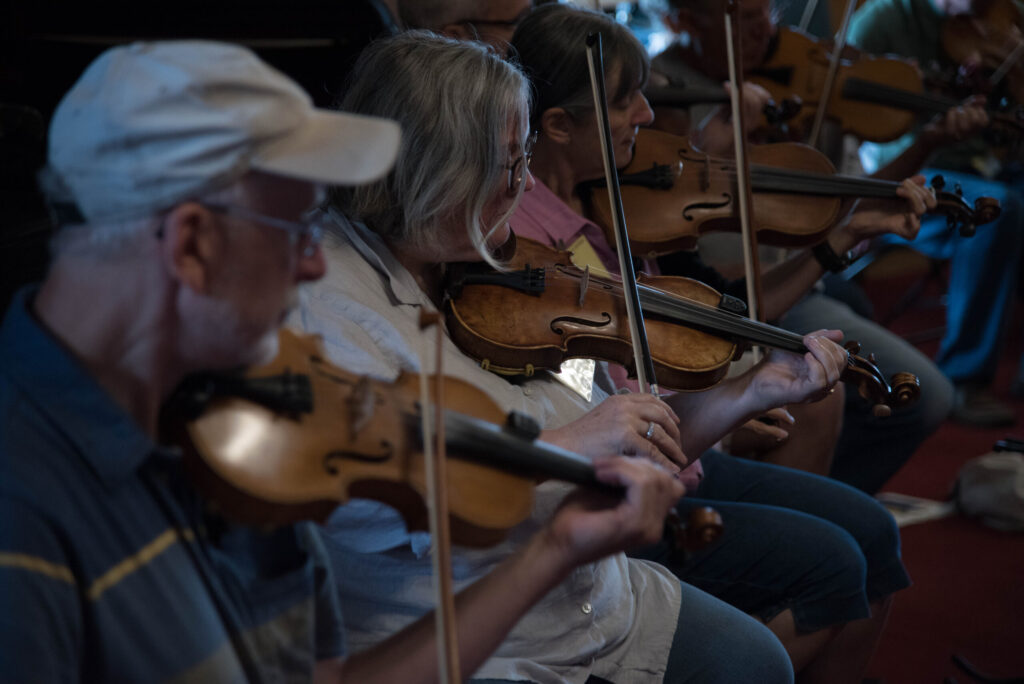Oral storytelling was a frequent practice in my house growing up. Every Sunday, we would have a family dinner or lunch with my grandparents and great aunts and spend an hour or two telling old stories about the people and places around us. While I grew up listening to family members tell stories, other young Appalachians explored their past through intergenerational music. When I started with Augusta this fall, I began learning about the practice of learning instrumental tunes and teaching them by ear to younger generations. The idea of passing on tunes without lyrics was fascinating to me. I started thinking about it when a particular song kept popping up.
Recently, Tyler Childers released an album of mostly old-time tunes, including the fiddle tune, “Bonaparte’s Retreat.” I began noticing the prevalence of this tune in the old-time community and in Augusta’s archives. In addition to Childers’ rendition, Melvin Wine, Ernie Carpenter, Bill Stepp, and many others have paid tribute to this old-time gem. Among many other purposes, music is a form of expression. I wondered why this form of expression—traditional fiddle tunes—was important, and why a tune seemingly about Frenchman Napoleon Bonaparte is treasured in Appalachia.
“Bonaparte’s Retreat” is part of a canon of old-time tunes that musicians have committed to learning and teaching by ear. The first recording of “Bonaparte’s Retreat” was by A. A. Gray in 1924 in Georgia. Originally a non-dance style fiddle tune, it traces back to the 1870s in Ireland. In 1937, song collector Alan Lomax recorded Bill Stepp’s now famous rendition. Stepp’s performance transformed it into a dance tune later incorporated into Aaron Copland’s ballet, Rodeo.
Titles of classic tunes like “Bonaparte’s Retreat” are significant because they indicate that the tune contains a story about a particular event. It enables the tune to function as a historic preservation tool. Intellectual interest in the event can aid in preserving the tune over time, and in turn, allow the structure and style of the fiddle playing to be passed down. I was initially unsure how one would decipher the meaning without the title. However, many of the songs have lyrics even if they aren’t sung all the time.

As I researched further, I learned that the emotionality of tunes is of paramount importance to old-time music and contributes to the interpretation of the tune. While some musicians are dedicated to preserving the old-time sound and structure, I think that the emotional connection to the music, and to the musician, also inspires people to continuing playing and passing down old-time tunes. It is difficult to explain how music moves people, but I think most people know what it feels like. Music can bring you to tears or make you feel connected to something bigger than yourself. Even if the emotion isn’t a positive one, dramatic or haunting melodies can be stirring. These emotion-triggering sounds are expressions of a culture and history, signifying values, important events, and feelings.
While I think even those with an untrained ear can appreciate the sound of old-time tunes, skilled players and enthusiasts can pick up on subtle styles and recognize the value of these older tunes with distinct structures. “Bonaparte’s Retreat” contains significant stylistic components and expressions about a historic event: Napoleon Bonaparte’s retreat from Russia in 1812. Having recognizable song titles like “Bonaparte’s Retreat” is useful for those without extensive musical knowledge to engage with the music. I came across a recording of a fiddler player tapping his foot in time with the music, emphasizing the tempo. He conjured an image of soldiers marching to a somber melody and helped me engage with the music.
The tradition of passing down these tunes is part of their value. The collaborative experience of learning the tunes as well as the sentimentality of that experience enhances the significance of the tune itself. The act of passing down the tunes seems to become part of the music’s story. Since starting at Augusta, I’ve observed that much of the appeal of summers at Augusta is the opportunity for collaboration. People—teachers and students alike—seem to bond through their appreciation for music, dance, and folk culture, creating the perfect atmosphere for passing down and celebrating old-time tunes like “Bonaparte’s Retreat.”
Although fully appreciating the intricacies of the tune may be difficult for non-fiddle players like me, I can understand why passing down these old songs by sound is a worthwhile practice. Learning it by ear involves sitting with the melody and taking in the structure and emotional tone. Interacting with the tune in such a deep way ensures that the next generation to teach it will have a grasp of its historic and musical relevancy. Although different from the style of storytelling I grew up with, these songs represent an important way to engage with heritage, memory, tradition, and folklore.

